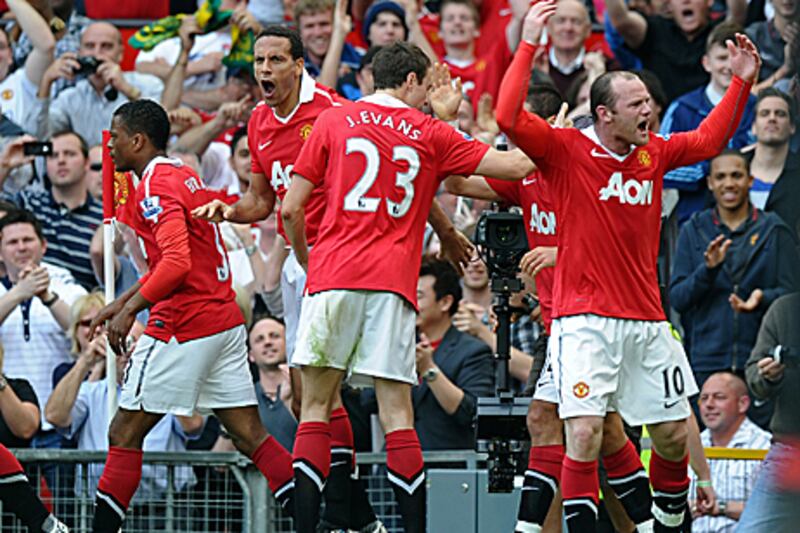In a segment of the season that includes the Champions League semi-finals plus meetings with Arsenal and Chelsea, an encounter with Everton may be deemed the forgettable fixture in Manchester United's run-in.
Barring a typically, but still wonderfully, predatory piece of finishing from Javier Hernandez, Saturday's 1-0 win does not rank as the most memorable match either.
Yet its significance lies in more than simply the accumulation of three more points towards the title.
It was a microcosm of United's year: their near-perfect record at Old Trafford, their infamous ability to score late goals, something that Bolton Wanderers, Blackpool, Aston Villa, Wolverhampton Wanderers, Liverpool and Stoke City have all experienced, and their capacity to win with weakened teams.
As Arsenal can testify, emerging victorious with a full-strength side presents enough difficulties.
United pose additional challenges for themselves, the need to balance different priorities ensuring Sir Alex Ferguson perms from a large ensemble cast.
They are aided by their powers of intimidation: some opponents, sufficiently cowed by their hosts' reputation, barely put up a fight at Old Trafford.
United reap the rewards of years of dominance, the attitude of others giving them an inherent advantage.
It is an astonishing statistic that no visiting player has scored a first-half league goal there this season, but too many have not even tried.
Some seem content to settle for a respectable defeat. Everton do not belong in that category, as the resistance of Phil Jagielka, Sylvain Distin and Tim Howard proved.
Perhaps they played for a 0-0 draw, but they almost got it.
It is in such situations that Ferguson seems to straddle the fine line between confidence and complacency.
The United manager is the master at squad rotation, but risk is a constant.
He forever appears on the verge of underestimating his opponents and overrating some of his less distinguished players.
The quest to keep many fresh for tonight's game against Schalke meant Nemanja Vidic, Ji-sung Park, Rafael da Silva and Michael Carrick went unused against Everton, while Dimitar Berbatov was sidelined and Paul Scholes suspended.
Ryan Giggs and Patrice Evra were called upon only for cameo roles. If this was, on paper, the easiest of the five major matches within a fortnight, the United team sheet seemed to suggest as much.
The selections of Jonny Evans, who has had an undistinguished season, and Darron Gibson, who simply is not a United player, were not enforced. These are choices that threaten to backfire, decisions that provoke many a moan among fans in the stands.
Ferguson is touchy about criticism of his squad players, even though there is a group, including Gibson, Evans, Wes Brown, Michael Owen, Tomasz Kuszczak, Gabriel Obertan and Bebe, who have made a minimal contribution over the course of a campaign.
A man-for-man breakdown of some of the sides picked at Old Trafford hints at a fallibility; so, in many cases, do the performances.
The results indicate otherwise: United have a mentality and an aura, Ferguson invariably keeps a potential match winner in reserve and triumphs in his game of brinkmanship.
So it was on Saturday, the removal of Gibson a precursor to their finest spell of the match, including Hernandez's winner.
It is part of orthodox footballing thinking that title campaigns are based on home wins, 1-0 and 2-0 victories and relentless consistency.
Where United differ from the norm is that so many of the seemingly routine triumphs are accomplished when holding so much in reserve.
But that is part of the bigger picture: should they reach the Champions League final, it will owe much to their habit of picking up Premier League points without requiring many of their first-choice players to exert themselves.
>>>
Football's illogicality has rarely been better illustrated than at Sunderland's Stadium of Light on Saturday.
After scoring two goals in 11 hours of football, Sunderland managed four in 18 minutes, the last three of them despite not having a specialist striker on the pitch.
It was a result that effectively secures their future in the Premier League which, if Asamoah Gyan and Danny Welbeck, who both went off injured, are out for the remainder of the season, may be just as well.
Yet the postscript to the game was as strange as anything that went before it: Franco di Santo, the Argentine who came on as a substitute, belatedly scored his first goal for Wigan Athletic.
A striker who often seems to have no interest in scoring, Di Santo's tally in England now stands at two goals in 67 games.
He is the forward who makes Emile Heskey look like Gerd Muller. Sunderland, at least, can console themselves with the thought that they have midfielders who are infinitely more prolific.
>>>
The strangest sight of the weekend came at Wolverhampton Wanderers, where a furious Mark Hughes required three swipes of his once feared right foot to make contact with a water bottle.
It was deemed a sufficiently serious offence for the Fulham manager to be banished to the stands, but the air of implausibility did not end there.
Hughes's explanation for his incompetence was that his trousers were too tight.
For a man who began his playing career in the 1980s, the decade of the overly restrictive shorts, that is no excuse.






